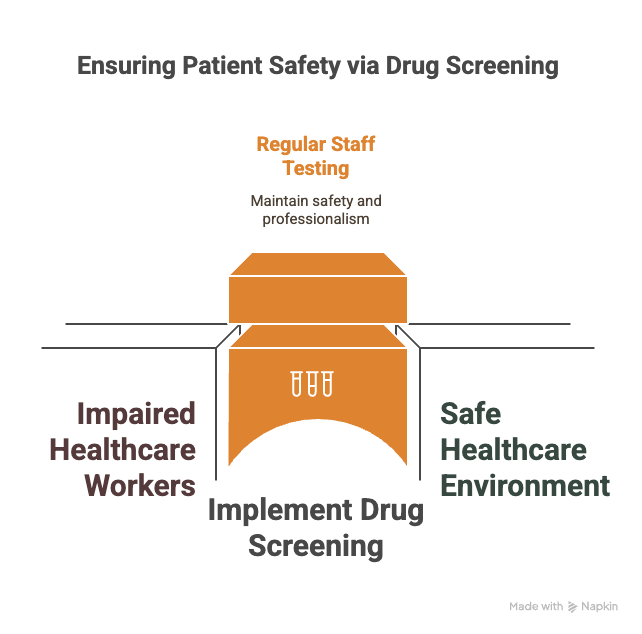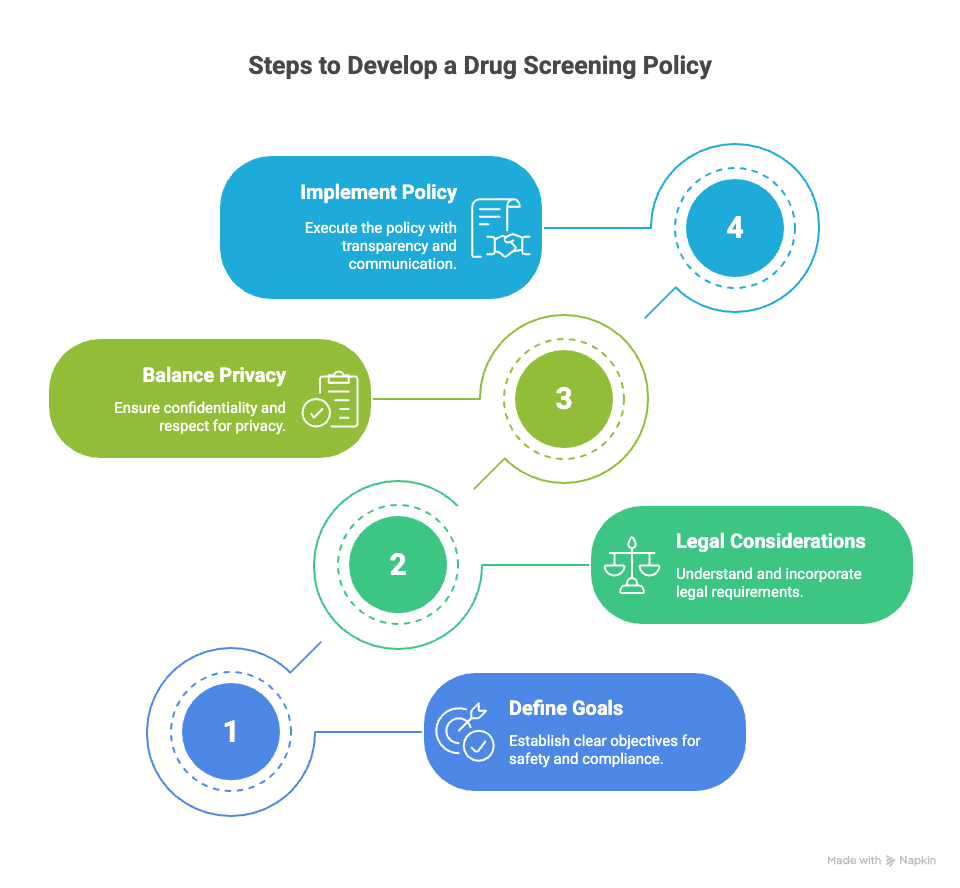The healthcare industry holds a special responsibility in ensuring the safety and well-being of patients. Because healthcare professionals often have access to sensitive medications and patient care, the question of drug testing within this field is particularly pertinent. Implementing a comprehensive healthcare drug screening policy can help ensure a safe, productive, and trustworthy environment for both employees and patients.
In this article, we'll explore the ins and outs of healthcare employee drug testing, discuss the implications for hospitals, and outline the key considerations for establishing drug screening as part of pre-employment processes. Whether you’re an HR professional in the healthcare sector or a policymaker, understanding these aspects can help you create an effective screening package that safeguards your organization's integrity.
Key Takeaways
- Drug testing in the healthcare industry is crucial as it helps prevent impairment, ensuring patient safety and staff effectiveness.
- Various testing methods, such as urine, blood, hair follicle, saliva, and breath tests, offer tailored solutions for detecting recent or habitual substance use.
- Developing a comprehensive drug screening policy involves clear goals, legal compliance, and a balance between privacy and safety.
- Consistent and fair testing in hospitals enhances trust, safety, and professional standards, protecting both patients and staff.
- Effective drug screening policies reduce liability risks and support a safe and trustworthy healthcare environment.
Introduction
Drug testing in the healthcare industry isn’t just about compliance; it's about responsibility. With access to controlled substances and charged with patient care, healthcare workers operate in a high-stakes environment where impairment can have serious consequences. Drug testing policies help protect both patients and staff by ensuring those on the job are working safely and effectively.
They demonstrate that a company is concerned about safeguarding people and establishing confidence among the people they are serving. Drug testing is done properly and transparently if it ensures security and professional integrity.
In this article, we aim to provide a clear understanding of why healthcare employee drug screening policies matter and how they can be successfully implemented. This information is crucial for employers and policymakers wanting to maintain a safe and trustworthy healthcare environment.
We'll go over the importance of drug testing, the benefits it brings, and the factors you need to consider when adding drug tests to your healthcare screening package.
EXPERT INSIGHT: Through my exposure to Human Resources, I learned that drug testing policies transcend compliance; they belong to a higher realm of responsibility. When one's people's trust and safety are concerned, how such policies are developed and implemented becomes an important consideration. It's not just about learning about issues but preventing harm even before it occurs and providing a platform where people can flourish. Responsible and fair-minded drug screening is about promoting responsibility as much as compassion, indicating that people's health is as important to us as organizational integrity. Safeguarding people is ultimately about doing so with people's trust remaining intact. - Charm Paz, CHRP
The Necessity of Drug Screening in Healthcare
Every day in healthcare carries high stakes. With access to controlled substances and critical patient care responsibilities, there's no room for error. Drug testing is not just an option here; it's a necessity. It puts a barrier between potential impairment and patient safety.

Drugs can affect judgment and slow reaction times. In healthcare, these lapses can be life-threatening. Imagine a nurse, clouded by substance use, administering medication incorrectly. Screening helps prevent these situations, ensuring that staff can perform their duties safely and effectively.
Trust is the currency of healthcare. Patients and their families rely on professionals to act in their best interest. Regular drug testing supports this trust by reinforcing the integrity of the organization. It says, "We hold our staff to the highest standards of safety and professionalism."
How do you plan to assure a drug-free workplace? Are you prepared to manage the implications of substance abuse within your team? Understanding and implementing drug testing is an essential step toward addressing these questions.
Types of Drug Tests Used in Healthcare
Drug testing is essential in healthcare for ensuring a safe environment. Here, we'll look at the main types used in the industry.
Urine Drug Tests: These are the most common. They are cost-effective and can detect a wide range of substances, from marijuana to opioids. Urine tests are often used due to their quick results and non-invasiveness. They indicate recent drug use and are typically part of pre-employment screening.
Blood Tests: These tests are precise and can determine the exact level of drugs in the system. They are expensive and invasive but useful when immediate impairment is suspected. Blood tests are less common for routine checks due to these factors but are valuable in specific scenarios, such as post-accident testing.
Hair Follicle Tests: These tests provide a longer detection window, typically up to 90 days. They are useful in uncovering habitual use rather than recent consumption. While more expensive, hair tests help identify persistent substance use, making them a good option for long-term safety monitoring.
Saliva and Breath Tests: Saliva tests are quick and less invasive, ideal for detecting recent drug use. They are especially useful for screening for alcohol and certain drugs. Breath tests are primarily used for alcohol detection, offering immediate results about current intoxication levels.
Each method brings different strengths, so consider what best fits your organization's needs. Are you focusing on recent use or long-term patterns? Do you need results immediately, or is precision more important? Tailoring your approach ensures comprehensive and effective drug screening policies.
Developing a Comprehensive Healthcare Drug Screening Policy
Crafting a healthcare drug screening policy, you begin with clear goals. Your primary aim is safety for patients and staff while ensuring compliance with legal requirements. These objectives should be integral to your policy, guiding every step.
Legal considerations play a fundamental role. The Americans with Disabilities Act (ADA), for example, impacts drug test protocols. This means your policy must differentiate between legal and illegal drug use and accommodate those with prescriptions for certain medications. Understanding the guidelines from the Federal Trade Commission (FTC) is equally important. They outline how to conduct background checks fairly and lawfully, which can influence your drug testing processes.
Balancing privacy with safety is a challenge. Confidentiality is crucial to maintain trust among your employees. This needs careful handling. Your policy should explain how test results are protected and who can access them. It's essential that employees feel their privacy is respected, even as you prioritize patient safety and workplace integrity.

In summary, a well-thought-out drug screening policy not only protects your organization legally but also fosters a secure environment for both patients and staff. Prioritize transparency and communication to address any concerns and ensure a seamless implementation.
Implementing Drug Screening in Hospitals
When adding drug tests to your hospital's employment process, a structured approach is essential. Pre-employment testing plays a critical role. It helps filter candidates who may pose a risk due to substance use. You protect patient safety from day one by ensuring new hires meet high standards.
Routine and random testing aren't just about compliance. They're about maintaining ongoing safety and trust. Consider a system where regular checks are balanced with surprise tests. This approach keeps everyone alert and aware of the importance of staying clean and professional.
Handling positive results demands sensitivity and clarity. When a drug test returns positive, have clear guidelines in place. This might include verification of the test, consultations with medical review officers, and a clear communication channel with the employee. Decide beforehand if you will offer support for rehabilitation or if termination is the likely outcome. Clear consequences and pathways for action ensure everyone understands the policy fully.
Make these processes fair and transparent. Your staff and patients deserve to feel secure in a safe environment.
Benefits of an Effective Drug Screening Policy
Implementing a drug screening policy in healthcare brings tangible benefits. Firstly, it improves safety for both patients and staff. Drug use among healthcare workers can lead to errors, mishaps, or negligence, which jeopardize patient safety. With a robust drug screening process, you're better positioned to ensure that your workforce is composed of individuals who are mentally and physically prepared for their roles.
An effective drug screening policy enhances employee performance. When staff members know they are part of a drug-free environment, it can boost morale and commitment to their duties. There is a correlation between a sober workforce and higher productivity, which can translate to better patient care and increased job satisfaction among employees.
Moreover, maintaining a strict drug testing policy reduces liability risks. By screening for drugs, you not only protect your patients but also safeguard your organization from potential legal issues that arise from drug-related incidents. This can also help in lowering insurance premiums, as insurers may view your organization as less risky when robust drug policies are in place.
These measures help in preserving the reputation of your healthcare facility. Trust is critical in healthcare, not only from your patients but also from the public and regulators. A consistent and fair drug screening policy shows your commitment to upholding high standards of care and professional integrity.
Challenges and Considerations
Introducing drug testing in a healthcare setting isn't without its hurdles. You might face potential pushback from employees concerned about privacy and fairness. Many believe drug testing infringes upon personal liberties. To address these concerns, clear communication is vital. Explain the purpose and benefits of testing and ensure transparency in your methods.
Updating policies is another crucial aspect. The healthcare landscape is always shifting, especially with changing laws and drug trends. Your drug screening policies should adapt, staying compliant with regulations like the Americans with Disabilities Act and remaining sensitive to societal norms.
The technical side can be challenging as well. Running an effective drug testing program requires resources. You'll need suitable facilities, trained personnel, and reliable testing methods. Consider the logistics—how to manage sample collection, process results, and handle records securely. It's about creating a seamless system that works without disrupting the daily flow of hospital operations.
Conclusion
Imagine a healthcare setting where the risks posed by drug impairment are minimized, protecting both staff and patients. It's not just healthcare professionals who rely on medications for treatment—their access makes robust screening essential. Drug tests ensure that everyone upholds high standards in a setting where small mistakes can lead to significant consequences.
Consider how drug testing becomes a proactive tool: it helps detect issues early, allowing timely intervention before problems spiral. A structured and consistent testing approach sends a clear message about the organization’s zero-tolerance policy towards substance misuse. This clarity builds trust internally and externally, reinforcing the organization's commitment to safety and quality care.
So, should drug tests feature in your healthcare screening package? Evaluate your facility's unique needs. Does your current policy address real-world scenarios your staff faces? Reflect on whether your organization’s standards align with the expectations of those entrusting their care to you. Drug tests might be an invisible backbone of operational integrity, but their impact on public trust is anything but subtle.
Taking these steps can fortify your organization’s standing, ensuring you remain a trusted entity in the healthcare sector. Invite a discussion about your current policies, and consider whether enhancements are needed. After all, a robust drug testing policy isn’t just about preventing problems—it's about affirming your commitment to exemplary patient care and workplace safety.
Frequently Asked Questions (FAQs)
Is drug testing required for all healthcare employees?
Not all healthcare employees are mandated to undergo drug testing. Requirements vary by state, employer, and specific job roles. Some positions, especially those involving patient care or operating heavy machinery, may have stricter testing policies.
What kind of drug test do hospitals use?
Hospitals commonly use urine tests for drug screening, as they are cost-effective and easy to administer. Some may also perform hair or blood tests for a more thorough analysis.
Can a hospital hire you without a drug test?
While many hospitals require a drug test before hiring, some may hire without one if it is not a standard policy. However, they may still reserve the right to ask for testing at a later date.
How do healthcare employers handle positive drug tests?
A positive drug test is often met with serious consideration. Depending on the employer's policy, you might be offered rehabilitation support, placed on probation, or terminated. Policies vary, so it's crucial to understand a specific employer's approach.
Are drug tests part of a standard healthcare background check?
Drug tests are not always included in standard healthcare background checks. However, they are frequently conducted as a separate procedure during hiring or periodically during employment.
Can you refuse a drug test if requested by your healthcare employer?
Refusing a drug test can have consequences, such as job offer withdrawal, disciplinary action, or termination, depending on the employer's policies. It's essential to understand these policies before deciding.
How often are drug tests conducted for healthcare employees?
The frequency of drug tests varies. Some employers conduct random tests periodically, while others may test only at hiring or if there is a suspicion of substance use.
Do healthcare employers test for alcohol use as well?
Yes, many healthcare employers include alcohol screening in their drug testing protocols, especially if it affects job performance or patient safety.
What substances are typically screened in a healthcare drug test?
Standard drug tests generally screen for substances like marijuana, cocaine, opiates, amphetamines, and benzodiazepines. Specific substances tested can vary by employer.
Are there any exemptions for drug testing in healthcare employment?
Some employees, such as those in non-patient-facing roles, might be exempt from drug testing, but this depends on the employer's policies. Always check with your employer for clarity on their specific rules.
Definitions
Pre-Employment Screening
This is the process healthcare employers use to evaluate candidates before hiring. It often includes drug testing, background checks, and verifying qualifications. The aim is to ensure new hires meet safety, legal, and professional standards from day one. For example, a hospital may require a urine drug test before finalizing a job offer to a nurse.
Random Testing
Random testing involves conducting drug tests on employees without prior notice or a set schedule. It helps deter substance use in the workplace by maintaining an element of unpredictability. For instance, randomly selecting a few employees each month for testing shows that the policy applies consistently and fairly.
Medical Review Officer (MRO)
An MRO is a licensed physician responsible for reviewing and interpreting drug test results. Their role includes verifying any positive findings, checking for valid prescriptions, and ensuring that test outcomes are accurate before they are shared with the employer. This step helps prevent false conclusions and protects employee rights.
Americans with Disabilities Act (ADA)
The ADA is a federal law that protects individuals with disabilities from discrimination. In drug testing, it means employers must carefully separate illegal drug use from lawful medication use. If an employee tests positive due to physician-prescribed treatment, the company must consider accommodations instead of penalizing them.
Confidentiality
Confidentiality in drug testing refers to how employers handle sensitive information. Test results should only be shared with authorized personnel and stored securely. Respecting employee privacy while enforcing safety protocols creates a workplace built on trust and accountability. For example, keeping results limited to HR and the MRO helps prevent breaches.
References
- National Safety Council Report on Workplace Substance Misuse:
https://www.workplacesafetyscreenings.com/blog/why-pre-employment-drug-testing-is-crucial-heading-into-2025 - U.S. Department of Transportation Random Drug Testing Rate Changes (2025):
https://www.tangandcompany.com/update-2025-dot-random-testing-rates/ - Workplace Drug Test Volume & U.S. Market Data:
https://www.globenewswire.com/news-release/2025/05/01/3072351/0/en/Global-Drug-Testing-Market-Size-to-Hit-USD-21-30-Billion-by-2032-Fueled-by-Workplace-Safety-and-Rising-Substance-Abuse-SNS-Insider.html - Global Drug Screening Market Value Projections:
https://www.globenewswire.com/news-release/2025/04/17/3063573/0/en/Drug-Screening-Market-Size-Worth-USD-10-34-Billion-by-2034-CAGR-of-4-84-from-2025-to-2034.html
Still have questions?
Get in touch with our team today for a personalized demo and discover how our tailored volume pricing and packages can drive results for your business!
How useful was this page?*
Note: your comments are anonymous. We use them to improve the website. Do not include any personal details.
Visit our FCRA Compliance Tool or leave a message here if you need a response.
From the blog Explore the GCheck Content Hub

Navigating the New York Education Background Check Process: A 2026 Operational Guide
28 Jan, 2026 • 18 min read
Florida Education Background Checks: 2026 Compliance Guide for School Districts
27 Jan, 2026 • 19 min read
Texas Construction Background Check Requirements: Compliance and Best Practices for 2026
27 Jan, 2026 • 19 min readThe information provided in this article is for general informational and educational purposes only and should not be construed as legal advice or a substitute for consultation with qualified legal counsel. While we strive to ensure accuracy, employment screening laws and regulations—including but not limited to the Fair Credit Reporting Act (FCRA), Equal Employment Opportunity Commission (EEOC) guidelines, state and local ban-the-box laws, industry-specific requirements, and other applicable federal, state, and local statutes—are subject to frequent changes, varying interpretations, and jurisdiction-specific applications that may affect their implementation in your organization. Employers and screening decision-makers are solely responsible for ensuring their background check policies, procedures, and practices comply with all applicable laws and regulations relevant to their specific industry, location, and circumstances. We strongly recommend consulting with qualified employment law attorneys and compliance professionals before making hiring, tenant screening, or other decisions based on background check information.


